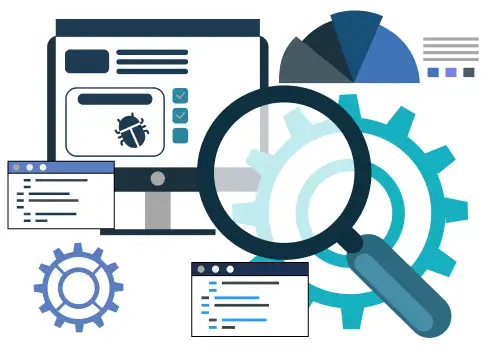Software Functional Testing Services

Experience comprehensive functional testing in software testing, ensuring your software meets specified functional requirements and user expectations. Our multi-level API and UI functional testing services detect defects early, streamline your test process, and reinforce product quality. Whether you’re focusing on isolated modules or cross functional software testing across integrated systems, we tailor our approach to your unique needs.
With over 10 years of collective industry experience, Etelligens delivers functional testing solutions that align with industry best practices, helping you reduce rework, accelerate time-to-market, and maintain compliance with quality standards.
Etelligens in Brief
- 10 years in software testing
- 510+ completed testing projects since 2014
- Over 45 testing specialists with broad domain expertise
- ISO 9001-certified quality management system
Functional Testing Services We Provide
Smoke Testing
Unit / Module Testing
Integration Testing
System Testing
Regression / Sanity Testing
User Acceptance Testing
We offer both manual and automated testing services, providing an optimal strategy for implementing functional testing in software engineering contexts. Our balanced approach ensures accurate coverage, stable performance, and timely defect detection.
Application Types We Test
- Enterprise applications (ERP, CRM, SCM, BPM, billing systems, etc.)
- BI and big data solutions
- Web portals
- eCommerce solutions
- Enterprise mobile applications
- Customer mobile applications
- IoT solutions
Cooperation Models
Managed Testing Services
We handle all testing activities, from planning to reporting.
Team Augmentation
Our experts strengthen your existing team, speeding up the testing process and knowledge transfer.
Setting Up Your Testing Team
Our QA consultants help you build an independent, high-performing testing unit aligned with industry best practices.
Methodologies We Support
Proficient in various project management methodologies, we ensure our testing adapts to your delivery model:
Agile family
- Scrum and customizations
Waterfall family
- Waterfall
- Customized RUP
- V-model
- Iterative development
- MSF
Our Approach to Functional Testing
Engaging early in the SDLC, we integrate closely with stakeholders to clarify requirements and prevent ambiguity. Our three-stage approach ensures maximum coverage and minimal defects:
Requirements Analysis and Clarification
We collaborate with BAs, developers, and business owners to validate requirements. This early involvement reduces misunderstandings, potentially saving hundreds of man-hours in rework.
Test Planning and Test Design
We create detailed test plans, map every requirement to test cases, and choose the right balance of manual and automated testing. By combining test design with smart tooling, we enhance efficiency and ensure that functional testing software testing efforts align with your objectives.
Stabilization (Test Execution and Reporting)
We execute planned tests, track defects in your preferred tool (Jira, Bugzilla, etc.), and run exploratory testing to uncover hidden issues. We validate fixes, perform regression testing, and provide transparent test summary reports. Our structured reporting helps you see the full quality picture and informs data-driven improvements.
Reporting and Bug Tracking Specifics
We maintain full transparency and control, offering comprehensive documentation:
- Checklists and test plans
- Test cases
- Test results reports
- Quality KPIs reflecting testing efficiency and product stability
We work with recognized bug tracking systems (e.g., Atlassian Jira, HP Quality Center) or adapt to your preferred tools. Our focus is on smooth communication, timely updates, and actionable insights.
Embracing Cross-Functional Testing and Continuous Improvement
In modern software engineering, cross functional software testing integrates input from diverse teams—developers, operations, product managers, and business analysts—to validate end-to-end workflows. By involving multiple stakeholders early and leveraging iterative feedback loops, we help:

Prevent Bottlenecks
Early testing identifies issues before they escalate, reducing expensive late-stage fixes by up to 15-20%.

Improve Collaboration
Cross-functional testing fosters a shared understanding of business goals and user expectations.

Enhance Performance & Scalability
Continuous improvement cycles ensure that each release grows more stable, secure, and responsive.
Frequently Asked Questions
1. What is functional testing?
Functional testing is a black box testing method that validates whether software performs as intended based on specified requirements. Rather than examining the code, it focuses on user-facing behaviors such as input handling, processing, and output accuracy. It ensures that core business functionalities like cart checkout or order confirmation operate reliably. Etelligens’ QA experts report that rigorous functional testing reduces post-deployment defects by up to 70%, directly impacting customer satisfaction and reducing costly rework.
2. What is the definition of functional testing in software engineering?
In software engineering, functional testing refers to evaluating a system against defined functional specifications to ensure it behaves as expected. Per IEEE, it is a black-box approach focused on input/output without examining code internals. This technique is essential for verifying business logic, and when implemented by Etelligens, it ensures alignment with stakeholder expectations while meeting industry standards.
3. What are the types of functional testing?
Functional testing includes multiple types: unit, integration, system, acceptance, smoke, sanity, regression, API, and UI testing. Each serves distinct goals, unit tests validate individual components, while acceptance tests confirm business readiness. Etelligens integrates these methods within testing pipelines, helping clients catch over 40% of defects early and reducing remediation time significantly.
4. How do you write effective functional test cases?
Effective functional test cases are clear, traceable to requirements, and include defined inputs, steps, and expected outcomes. They account for edge cases and ensure repeatability. Etelligens emphasizes naming conventions, test independence, and consistent reviews, cutting testing cycles by up to 25% and increasing overall QA efficiency.
5. What is the purpose of functional testing in software testing?
Functional testing ensures that software functions match business requirements. It detects defects, validates logic, ensures usability, and supports compliance. It builds stakeholder confidence while preventing regressions. Etelligens data shows functional testing reduces post-production issues by 85%, improving both reliability and ROI.
6. What are the best practices for functional testing?
Best practices include early testing, requirements traceability, risk-based prioritization, strategic automation, test data management, and continuous testing. Shift-left and test independence are also critical. Etelligens’ testing maturity model helps clients implement these practices, achieving up to 35% lower defect costs and faster delivery.
7. What is the role of functional testing in the software development lifecycle?
Functional testing supports every SDLC phase, from validating requirements to ensuring post-deployment stability. It provides continuous feedback in agile and DevOps models. Etelligens integrates functional testing across cross-functional teams, enabling faster iterations, fewer critical defects, and improved stakeholder alignment.
8. What are the different types of functional testing techniques?
Techniques include equivalence partitioning, boundary value analysis, decision tables, state transitions, use case testing, exploratory testing, and more. These improve test coverage and defect detection. Etelligens combines multiple methods in each phase, increasing testing effectiveness by up to 40% and reducing overlooked issues.
9. What tools are used for functional testing?
Popular tools include Selenium, Appium, TestComplete, JUnit, Cucumber, Postman, Katalon Studio, TestRail, and JIRA. Tool choice depends on the tech stack and project needs. Etelligens leverages this tool ecosystem to drive faster execution, automate key workflows, and increase test coverage by 25–30%.
10. What is the difference between functional and non-functional testing?
Functional testing verifies what the system does, like login or checkout, while non-functional testing ensures how well it performs under conditions like load or security. Both are essential. Etelligens uses a dual approach to ensure both correct functionality and excellent user experience, reducing long-term risks and enhancing application quality.



